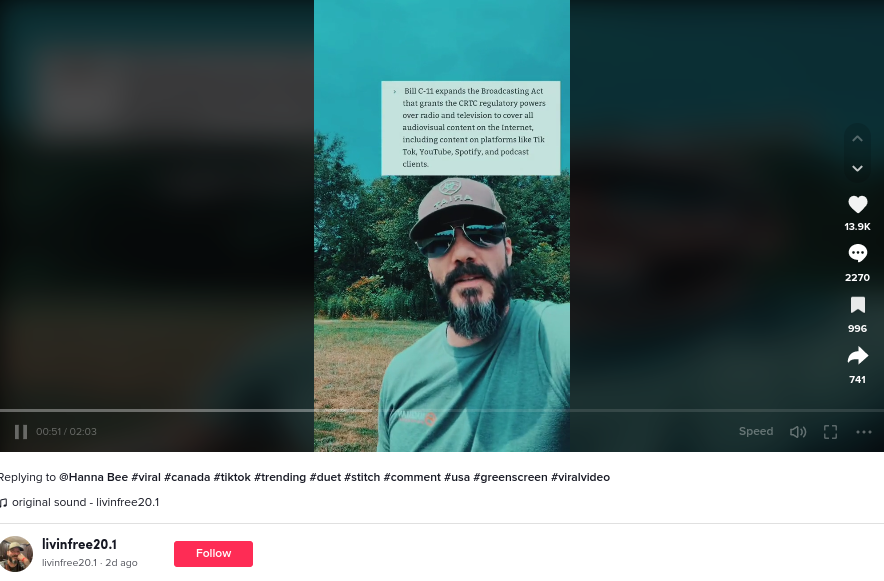
Has Canada's Bill C-11 caused Canadians' social media posts to be censored, including posts about Canadian wildfires? No, that's not true: Bill C-11, also known as the Online Streaming Act, became law in Canada in April 2023. It requires that online streaming platforms contribute to Canadian content and only affects online streaming companies, not users who create content and post it on the platforms.
The claim appeared in a video (archived here) posted to TikTok on June 10, 2023. The video featured a person answering a question about why Canadian TikTok users have (supposedly) not posted about Canadian wildfires that have burned across the country starting in late April 2023. Starting at the 15-second mark of the video, the person in the video says in part:
So, short answer to this: censorship. If there's any of our Canadian brothers and sisters out here who see this, who want to comment on this, who want to maybe set me straight if I'm incorrect on any of what I'm about to show you, please do. But this is what I got.
If you remember not too long ago there was a lot of posts from our Canadian brothers and sisters who were talking about bills that were being passed that were going to limit and censor online streaming posts especially on apps like this, on TikTok. That was Bill C-10. C-11 expands on that bill.
Bill C-11 was passed on April 27th of this year. It expands on the Broadcasting Act. And it grants the CRTC, the Canadian Radio-Television [and] Telecommunications Commission, power over the content on the Internet.
So does it give the CRTC the ability to regulate posts that are put out on the Internet from Canadians? Short answer: yes. They monitor and they regulate the content that goes out on apps like TikTok. And if the narrative, if the information isn't what they want to be communicated, well I imagine they'll be limiting those posts.
This is how the video looked on TikTok at the time of writing:

(Source: TikTok screenshot taken on Tue Jun 13 16:50:47 2023 UTC)
Bill C-11, which was introduced in the Canadian Parliament's House of Commons and was made law on April 27, 2023, amends the country's Broadcasting Act. The Broadcasting Act's purpose is to "encourage the development of Canadian expression." Broadcasters can achieve this by supporting and highlighting Canadian media that reflect the country's attitudes and values.
This means that users on social media will not be subject to the changes brought on by the bill: Rather, only online streaming services, television service providers and programming service providers will be directly affected by the bill since all those categories are regulated by the Broadcasting Act.
The purpose of Bill C-11 is not to censor user-generated content on social media. Instead, the bill was created to require online streaming platforms like YouTube to promote and contribute to Canadian media, as the Broadcasting Act has already required of television and radio broadcasters. At the time of writing, the Canadian government was still determining how to best implement the changes that Bill C-11 calls for and is still in Phase 1 of its plan to modernize Canada's broadcasting system. (See the archived version here for the progress Canada has made in its regulatory plan at the time of writing.)
The person in the TikTok making the claim seemed to pull their information from this frequently asked questions page about Bill C-11 from OpenMedia, a nonpartisan and nonprofit organization that aims "to keep the Internet open, affordable, and surveillance-free." The organization currently is requesting signatures on a petition that asks Pablo Rodriguez, the minister of Canadian heritage, to "issue a policy direction to the CRTC that cleans up how Bill C-11 is applied in practice."
Several social media videos exist that show footage of the wildfires that are burning in Canada at the time of writing. On TikTok, such videos can be found by searching for phrases such as "Canadian wildfires" and "wildfires Canada."
Lead Stories has previously debunked claims stating that the wildfires in Quebec were coordinated and that the Canadian wildfires were caused by actions taken by Canadian officials.

















